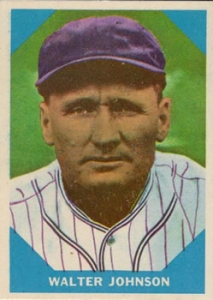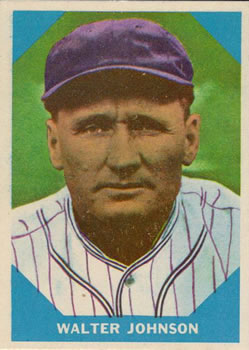April 13, 1926: Big Train takes a long journey to defeat Connie Mack’s Athletics
 Opening Day, at least as far as the Washington Senators were concerned, was Walter Johnson’s private domain. Johnson made his first Opening Day start for the Senators in 1910, shutting out the Philadelphia Athletics, 3-0. In the next 15 years, Johnson missed only three Opening Day nods, and won five straight openers between 1913 and 1917. In six Opening Day starts beginning in 1910, the A’s were the opponent, and Johnson was 4-2 in those games, with all four wins shutouts. So it was no surprise when Nats manager Bucky Harris named Johnson to start the 1926 season against Connie Mack’s men.1
Opening Day, at least as far as the Washington Senators were concerned, was Walter Johnson’s private domain. Johnson made his first Opening Day start for the Senators in 1910, shutting out the Philadelphia Athletics, 3-0. In the next 15 years, Johnson missed only three Opening Day nods, and won five straight openers between 1913 and 1917. In six Opening Day starts beginning in 1910, the A’s were the opponent, and Johnson was 4-2 in those games, with all four wins shutouts. So it was no surprise when Nats manager Bucky Harris named Johnson to start the 1926 season against Connie Mack’s men.1
Nor should have anyone been surprised to see that Mack considered Slim Harriss to face Johnson on Opening Day. In both the 1923 and 1924 openers, Harriss and Johnson faced off, with Harriss winning the 1923 game, 3-1 and Johnson prevailing, 4-0, in 1924. However, Mack was considering three others to start as well – Sam Gray, Stan Baumgartner, and Eddie Rommel.2 It would be the knuckleballer Rommel who would get the ball to face the Big Train.
It had been customary in the previous few years for the president of the United States to throw out the opening pitch in Washington to start the baseball season, but President Calvin Coolidge, mourning the death of his father, did not attend. The US Senate adjourned three hours early on this day so that Vice President (and Nobel Peace Prize recipient) Charles Dawes was tasked with throwing out the first pitch in Coolidge’s stead.3 Dawes’ throw sailed three feet over the head of Johnson, who was positioned about 30 paces away.4 It would be one of the few missteps from anyone participating in the nation’s capital on this chilly day.
In the first four innings, Johnson gave up two singles, a one-out single to Bill Lamar in the first inning, and a two-out single to Max Bishop in the third. Neither man left first base. Rommel was better, not allowing a baserunner through the first 12 Washington hitters. When Johnson batted with two out in the bottom of the third, Vice President Dawes accompanied 9-year-old Edwin Marshall of Springfield, Illinois, to the plate. Edwin had won a trip to Washington in an essay contest and presented Johnson with a silver cup.5 Johnson rolled through the top of the fifth, adding his fourth strikeout of the game, and the Senators finally got a man on board in the bottom of the frame when Joe Harris singled to right. A sacrifice by Joe Judge made Harris the first player to get to second base in the game, but he would move no further.
The Senators got runners to second base in the sixth and seventh innings as well but neither could advance. A two-out single to center and steal of second by Sam Rice brought manager Harris to the plate, but his groundout to Rommel ended the sixth. In the seventh, a two-out single by Judge and Rommel’s first walk of the game, to Ossie Bluege, again put a runner in scoring position, but again Rommel induced an inning-ending groundout. Both Johnson and Rommel threw perfect eighth innings, and in the top of the ninth, the loneliness of third base ended. Johnson had allowed only one hit since the third, a single by Al Simmons, who was quickly erased in a double play. Now in the ninth, a one-out walk to Bishop, Johnson’s first of the game, started a small rally. The free pass was followed by Lamar’s grounder to Buddy Myer, whose wide throw to first pulled Judge off the bag, and the A’s had two aboard for the first time. Walt French followed with a fly to right that allowed Bishop to get to third. But there he remained as Johnson induced a soft line drive by Simmons to Goose Goslin to end the threat. The Senators followed with a rally of their own that also fell short. Manager Harris walked to start the frame and was sacrificed to second by Goslin. Joe Harris popped out to first, and then Judge was intentionally walked. The strategy worked, as Bluege grounded into a fielder’s choice, and the 25,000 in attendance would have to bundle up for further baseball.
Neither pitcher was bothered with a little overtime, as both were perfect in both the 10th and 11th, with Johnson adding four more strikeouts to his major-league-leading career total.6 In the 12th, however, both teams had a chance to end the proceedings. Lamar’s second single of the game started the frame for the A’s and a sacrifice and groundout moved him to third. Johnson walked Joe Hauser, bringing up future Hall of Famer Mickey Cochrane, whose long liner was caught by Rice in center. In their half, the Senators loaded the bases with one out on singles by Judge and Bluege and a walk to Myer. Manager Harris had Jack Tobin pinch-hit for catcher Muddy Ruel, but his grounder to short forced Judge at home. Johnson had a chance to end the game but flied out to right, sending the game to the 13th. Johnson pitched around a leadoff single in the top of the inning and then the Senators again loaded the bases without tallying, as Bluege popped up with the winning run on third. Johnson found himself in trouble in the 14th when with one out Walt French had the first extra-base hit of the afternoon, a double to left. A fly ball moved French to third, but after a walk, Cochrane again failed to deliver by flying harmlessly to left.
The Senators sent everyone home to a warm shower in the 15th, when with one out three consecutive hits ended the game. Manager Harris singled to center and moved to third on Goslin’s double to right. Joe Harris’s single to left drove in Bucky and gave Johnson his 108th career shutout. The winning manager was excited about how the season had started. “I hope I’m not unduly optimistic, but it seems to me that the boys proved that they are not only in good physical condition but have the same old will to win that has meant so much the past two years,” Harris said. “They say a good start is half the battle. They’ll have to catch us to beat us.”7 The Senators would be caught and unable to defend their crown, finishing fourth in the league. The game was the sixth and last in which Johnson threw 15 innings or more, his first since a 7-6 loss to the Detroit Tigers in August of 1918. It was his ninth Opening Day victory, still a major-league record as of 2019.
For Johnson, in his 20th major-league season, his next start was seven days later against the New York Yankees, who battered him for seven runs in three innings in an 18-5 defeat. Then he won his next five decisions, all but one a complete game. Rommel, 10 years younger than Johnson, threw in relief against the Senators on the 16th, three days after the 15-inning game, then again in Philadelphia on April 21, beating Washington 5-2 on a three-hitter. He pitched more than nine innings only twice more in his career. One of these games was a historic 17-inning relief appearance on July 10, 1932, against the Cleveland Indians, winning 18-17.
Sources
In addition to the sources listed in the Notes, the author accessed mlb.com, Retrosheet.org, and Baseball-Reference.com.
retrosheet.org/boxesetc/1926/B04130WS11926.htm
baseball-reference.com/boxes/WS1/WS1192604130.shtml
Notes
1 Only Tom Seaver (16) has made more Opening Day starts than Johnson. Another Johnson, Randy, and Steve Carlton and Jack Morris are tied with Walter Johnson with 14 openers.
2 James Isaminger, “Lamar Injured, but May Play in Opener,” Philadelphia Inquirer, April 13, 1926: 22.
3 Paul W. Eaton, “Business as Usual with the Senators,” The Sporting News, April 22, 1926: 1.
4 James Isaminger, “Athletics Bow to Senators Before Huge Crowd in Fifteen-Inning Diamond Duel,” Philadelphia Inquirer, April 14, 1926: 27.
5 “Johnson Promises Boy to do His Best and He Does,” Washington Post, April 14, 1926: 1.
6 At the beginning of the 1926 season, Johnson had 3,336 strikeouts, 533 more than second-place Cy Young.
7 Denman Thompson, “Johnson Brilliant in Blanking Mackmen, 1-0, in 15-Inning Season Inaugural,” Washington Evening Star, April 14, 1926: 36.
Additional Stats
Washington Senators 1
Philadelphia Athletics 0
15 innings
Griffith Stadium
Washington, DC
Box Score + PBP:
Corrections? Additions?
If you can help us improve this game story, contact us.


